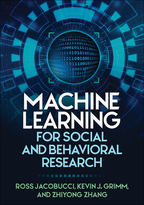Machine Learning for Social and Behavioral Research
Ross Jacobucci, Kevin J. Grimm, and Zhiyong Zhang
HardcoverPaperbacke-bookprint + e-book
Hardcover
orderJuly 17, 2023
ISBN 9781462552931
Price: $96.00 416 Pages
Size: 7" x 10"
Paperback
orderJuly 11, 2023
ISBN 9781462552924
Price: $64.00 416 Pages
Size: 7" x 10"
“Current, highly informative, and useful, this is a 'go-to' book for social science graduate students, faculty, and practitioners seeking a strong introduction to machine learning. Unlike typical, more technical machine learning books, this one is unique in providing the strong psychological measurement guidance required to apply these techniques most appropriately. It walks the reader through general principles of machine learning, regression- and tree-based predictive models, text- and network-based methods of clustering, and—most innovatively—machine learning–based psychometric approaches (CFA and SEM).”

—Fred Oswald, PhD, Professor and Herbert S. Autrey Chair in Social Sciences, Department of Psychological Sciences, Rice University
“This book is very timely. Social scientists need to be educated about the pros and cons of machine learning methods and about how, when, and why these methods can be applied to their research topics. The book describes key techniques in enough detail to enable readers to subsequently digest more specialized journal articles or software applications, but not in so much detail as to lose momentum.”

—Sonya K. Sterba, PhD, Department of Psychology and Human Development, Vanderbilt University
“Jacobucci, Grimm, and Zhang's ambitious book takes the reader on an in-depth tour of machine learning methods. Its strength is that the authors link machine learning to more traditional topics of regression, structural equation modeling, factor analysis, and network analysis methods. This book should be required reading for the new generation of psychology graduate students who are interested in more advanced quantitative methods.”

—James W. Pennebaker, PhD, Regents Centennial Professor of Liberal Arts and Professor of Psychology, The University of Texas at Austin
"A 'must read' for social scientists who want to familiarize themselves with machine learning but don’t know where to start. Understanding the practices and principles of machine learning is fundamental to modern data analysis. Many social scientists will be surprised by how well their traditional statistical training has prepared them to grasp the material in the book.”

—Alexander Christensen, PhD, Department of Psychology and Human Development, Vanderbilt University
—Fred Oswald, PhD, Professor and Herbert S. Autrey Chair in Social Sciences, Department of Psychological Sciences, Rice University
“This book is very timely. Social scientists need to be educated about the pros and cons of machine learning methods and about how, when, and why these methods can be applied to their research topics. The book describes key techniques in enough detail to enable readers to subsequently digest more specialized journal articles or software applications, but not in so much detail as to lose momentum.”
—Sonya K. Sterba, PhD, Department of Psychology and Human Development, Vanderbilt University
“Jacobucci, Grimm, and Zhang's ambitious book takes the reader on an in-depth tour of machine learning methods. Its strength is that the authors link machine learning to more traditional topics of regression, structural equation modeling, factor analysis, and network analysis methods. This book should be required reading for the new generation of psychology graduate students who are interested in more advanced quantitative methods.”
—James W. Pennebaker, PhD, Regents Centennial Professor of Liberal Arts and Professor of Psychology, The University of Texas at Austin
"A 'must read' for social scientists who want to familiarize themselves with machine learning but don’t know where to start. Understanding the practices and principles of machine learning is fundamental to modern data analysis. Many social scientists will be surprised by how well their traditional statistical training has prepared them to grasp the material in the book.”
—Alexander Christensen, PhD, Department of Psychology and Human Development, Vanderbilt University



